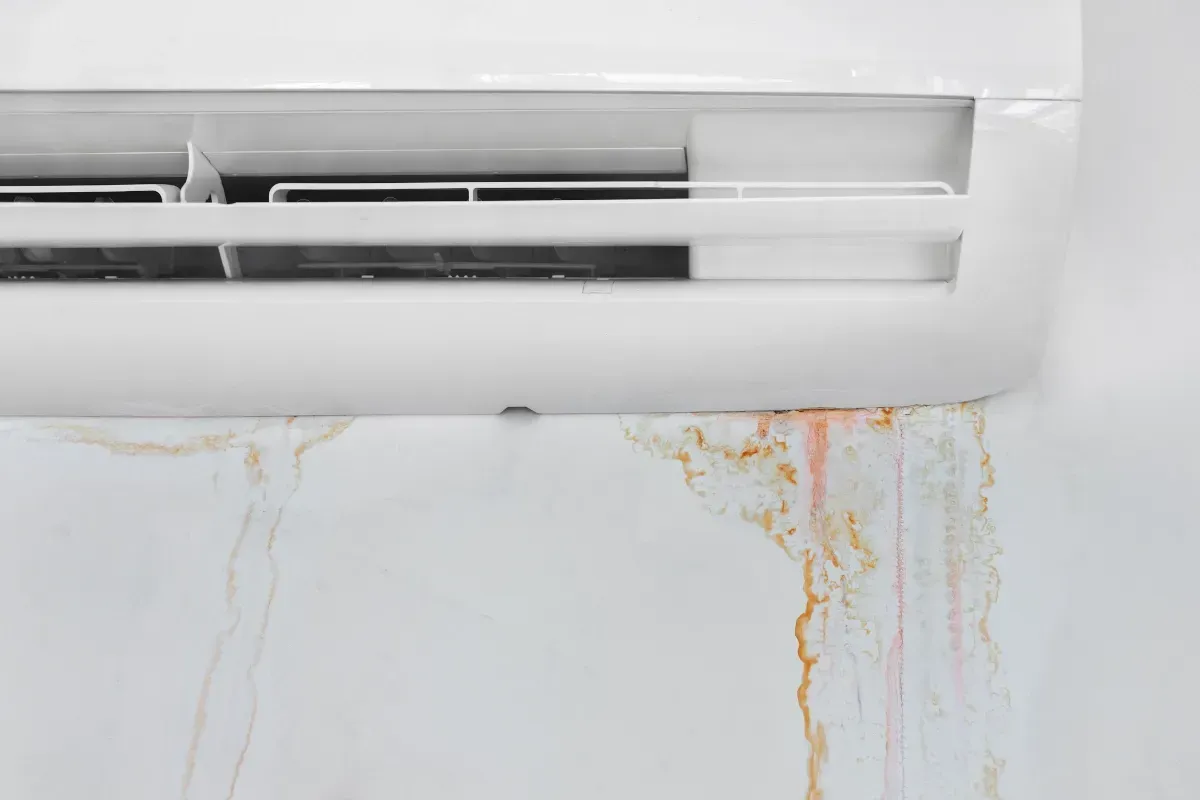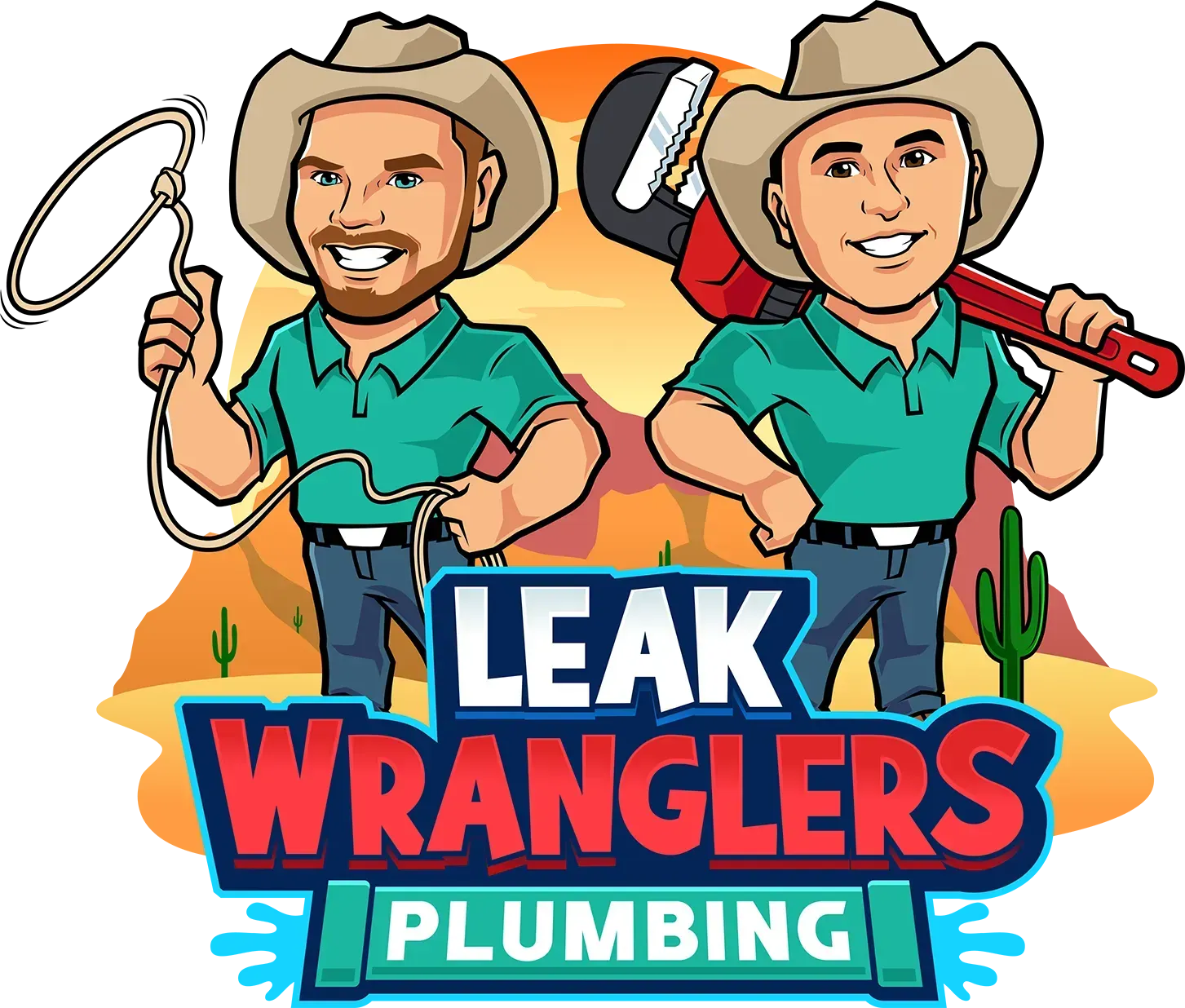
Allen Forman • May 23, 2025
Protecting Your Home Investment: What Every Homeowner Should Know About AC Leaks
Discovering water leaking from your air conditioner can be alarming, especially during the hottest days when you need your system most. As a homeowner who values comfort and efficiency, you understand that unexpected HVAC issues not only disrupt your family's comfort but can also lead to costly repairs and higher energy bills.
At Leak Wranglers Plumbing LLC, we know you take pride in maintaining your home and want to make informed decisions about your HVAC system. That's why we've created this comprehensive guide to help you understand why your air conditioner might be leaking water, what you can do about it, and when it's time to call in professionals to protect your investment.
Common Causes of an Air Conditioner Leaking Water Inside the House
Let's explore the six most common reasons your air conditioner might be leaking water indoors:
Clogged Condensate Drain Line
One of the most frequent causes of an air conditioner leaking water inside the house is a clogged condensate drain line. This drain pipe removes the moisture your AC pulls from the air, but over time it can become blocked with dust, dirt, algae, or mold. When the line is clogged, water backs up and overflows from your unit's drain pan.
Signs of a clogged drain line include:
- Visible water pooling around your indoor unit
- Musty odors coming from your AC system
- The AC shutting off unexpectedly (many modern units have float switches that turn off the system when water backs up)
According to the International Association of Certified Home Inspectors, a properly maintained condensate line can prevent up to 90% of water-related AC problems.
Dirty Air Filters
When your air filter becomes clogged with dust and debris, it restricts airflow over the evaporator coil. This reduced airflow can cause the coil to become too cold and eventually freeze. When the ice melts, it produces excess water that may overflow your drain pan.
The U.S. Department of Energy recommends changing your air filter every 1-3 months, depending on usage and environmental factors. This simple maintenance task not only prevents leaks but can also improve your system's energy efficiency by 5-15%.
Low Refrigerant Levels
Your air conditioner needs the proper amount of refrigerant to function correctly. Low refrigerant levels caused by leaks can lead to pressure drops in your system, causing the evaporator coil to freeze. When this ice eventually melts, it produces more water than your drain system can handle.
Signs of low refrigerant include:
- Reduced cooling performance
- Hissing sounds from your AC unit
- Ice formation on refrigerant lines
Broken Condensate Pump
If your AC system is installed in a basement or below grade location, it likely uses a condensate pump to move water upward to a drain. When this pump malfunctions, water can't be removed properly and will overflow.
A condensate pump typically costs between $40-$150 to replace—significantly less than the potential water damage repairs if left unaddressed.
Improper Installation
Air conditioners need to be installed level to allow proper drainage. If your unit isn't level, water may collect in the drain pan rather than flowing out through the drain line, eventually causing an air conditioner leaking water inside the house.
According to the Air Conditioning Contractors of America, improper installation can reduce your system's efficiency by up to 30% and significantly shorten its lifespan.
Frozen Evaporator Coils
Several issues can cause your evaporator coil to freeze, including the problems mentioned above (dirty filters, low refrigerant) as well as running your AC when outside temperatures are too low. When these coils freeze and later thaw, they produce excess water.
A properly functioning AC should not have frozen coils. If you notice ice on your evaporator coil, turn off your system and allow it to thaw completely before investigating further.
DIY Solutions for a Leaking Air Conditioner
Before calling a professional, here are some steps you can take to address an air conditioner leaking water inside the house:
- Check and replace air filters: This is the easiest fix and should be your first step. A new filter costs $10-$30 and takes minutes to replace.
- Clean the condensate drain line: You can often clear minor clogs by:
- Turning off your AC system for safety
- Locating the access point to your drain line (usually a T-shaped vent pipe near your indoor unit)
- Pouring 1 cup of white vinegar or bleach down the line to kill algae and mold
- After 30 minutes, flush with water
- Check that your unit is level: Use a standard level tool to verify your AC unit is properly aligned. Small adjustments can sometimes be made yourself if you're comfortable doing so.
- Empty the drain pan: If your drain pan is removable, empty it and clean it with soap and water to remove any buildup.
- Ensure proper airflow: Make sure no furniture or curtains are blocking your air returns or supplies.
When to Call a Professional
While DIY fixes can resolve many issues causing an air conditioner leaking water inside the house, some situations require professional expertise:
- If your system has low refrigerant levels, as handling refrigerant requires EPA certification
- When you suspect electrical problems with your condensate pump
- If you've tried DIY solutions but your AC continues to leak
- If you notice significant ice buildup on your coils that returns after thawing
- When your system is showing other signs of malfunction (strange noises, poor cooling)
Preventative Maintenance Tips
To avoid future problems with an air conditioner leaking water inside the house, follow these maintenance tips:
- Schedule annual professional maintenance: Having your system inspected and serviced once a year can catch potential issues before they cause leaks.
- Change air filters regularly: Mark your calendar to check filters monthly during heavy use seasons.
- Clean your condensate line quarterly: Pour a cup of vinegar down your condensate line every three months to prevent algae and mold growth.
- Install a float switch: This inexpensive device (typically $20-$50) will automatically shut off your AC if water starts to back up, preventing overflow.
- Monitor humidity levels: Keep indoor humidity between 30-50% to reduce the amount of condensation your AC needs to remove.
Regular maintenance not only prevents leaks but also:
- Extends your system's lifespan by 3-5 years
- Improves energy efficiency by up to 15%
- Reduces the likelihood of major breakdowns during extreme weather
Air Conditioner Leaking Water Inside the House: FAQs
Q: Is it normal for my air conditioner to drip a little water?
A: It's normal for your AC to produce condensation that drains outside. However, any water leaking inside your home is a problem that needs attention.
Q: How much does it cost to fix an AC leak?
A: Minor repairs like clearing a clogged drain line typically cost $75-$150. More complex issues involving refrigerant or component replacement can range from $200-$750.
Q: Can I run my AC if it's leaking water?
A: It's best to turn off your AC until the leak is resolved. Continuing to run it could damage your system or your home.
Q: How often should I clean my AC condensate line?
A: As a preventative measure, clean your condensate line quarterly with vinegar or bleach. If you've had clog issues before, monthly cleaning may be necessary.
Q: Will homeowners insurance cover damage from an AC leak?
A: Most policies cover sudden and accidental damage but may not cover damage resulting from poor maintenance. Check with your insurance provider for specific coverage details.
Get Professional Help for Your Leaking AC
If you're experiencing an air conditioner leaking water inside the house and DIY solutions haven't resolved the issue, Leak Wranglers Plumbing LLC is here to help. Our certified HVAC technicians can quickly diagnose and repair any AC drainage problems, preventing water damage and restoring your home's comfort. Don't wait until a small leak becomes a big problem—contact Leak Wranglers today to schedule your appointment with our experienced professionals.



